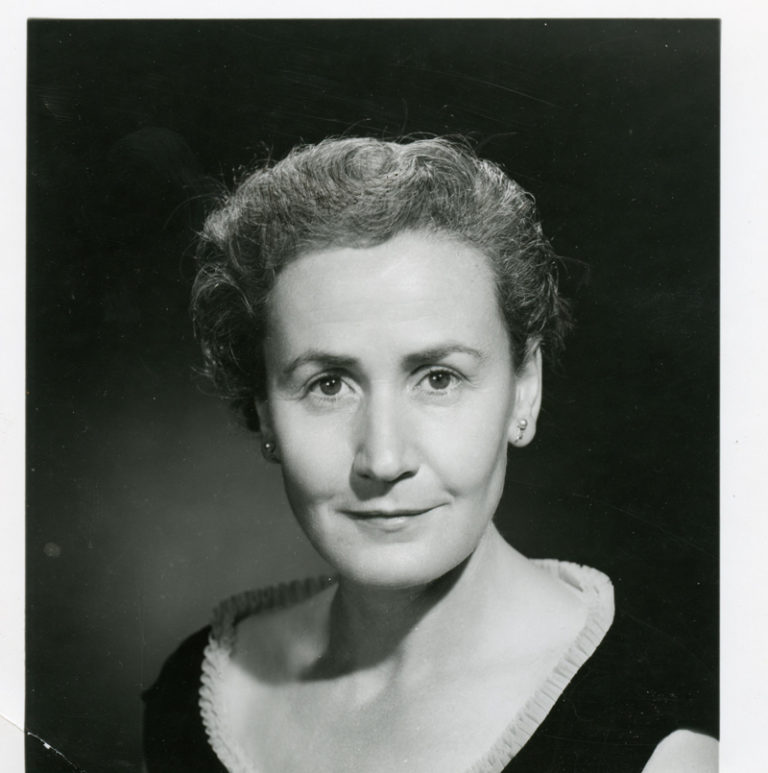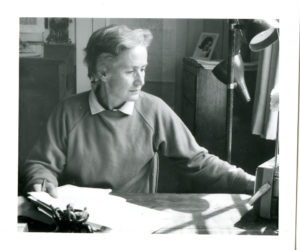
Sheila Burnford
Sheila Burnford
- Date of Birth: May 11, 1918, Scotland
- Date of Death: April 20, 1984, England
- Accomplishments related to: Writing, Literary Arts
- Major affiliations: Susan Ross, Port Arthur Puppetry Club, Walt Disney
Sheila Burnford is best known for writing The Incredible Journey, which was published in 1961. The Walt Disney film adaptation was released in 1963, making the book an even bigger success. However, there was a great deal more to her life than this one book.
She was born Sheila Philip Cochrane Every in Scotland in 1918. She was educated in boarding schools throughout England and Europe (including a year in Germany as Hitler took power).
She was one of the first women in Scotland to receive her Aviation Certificate. During the Second World War she worked as an ambulance attendant and driver.
She married Dr. David Burnford in 1941. They had three daughters: Peronelle, Jonquil and Juliet. In 1948, the Burnford family immigrated to Canada, settling in Port Arthur, Ontario (now Thunder Bay).
Sheila loved the great outdoors, particularly walking and hunting. She became friends with local artist Susan Ross. The two shared an interest in the lives of indigenous people and they inspired each other in creative endeavours.
Both Sheila and Susan were members of the Port Arthur Puppetry Club. It was during her time with the Club that Sheila began writing – scripts at first and then articles describing life in Northwestern Ontario for English magazines and newspapers such as Punch and the Glasgow Herald.
Sheila was a great animal lover, although she always said she had a practical view of them. After the death of her Bullterrier, Bill (who had kept her company during the Blitz in the Second World War), she decided to write a book, in part to memorialize him.
That book became The Incredible Journey.
The animals in the book were based on the personalities of her own animals. In addition to Bill, she had a Siamese cat (Simon) and a Golden Labrador (Raimie). She researched incidents similar to the ones in the book and used the area around her home and cottage (Loon Lake) to describe the terrain.
The book was an international bestseller and was eventually translated into more than 17 languages. It would win a number of awards, including the Canadian Library Association Book of the Year for Children Award (1963) and the Aurianne Award (1963).
In 1963 the Walt Disney adaptation of the film was released. The premiere of the film was held in Port Arthur with over 10,000 people lining the streets for the parade preceding the showing. Actors from the film and the film’s director, Fletcher Markle, attended the premiere. Although the book was based in Northwestern Ontario, it was actually filmed in the Toronto area.
In 1964, Sheila published her second book, The Fields of Noon, a collection of essays on life in Northwestern Ontario. It included a number of essays that had previously been published in English periodicals.
In the late 1960s, Sheila and Susan Ross spent a great deal of time visiting native reserves in Northwestern Ontario. Both women had long held interest in native life and found the opportunity to actually learn about native life to be irresistible. While there, Susan Ross drew sketches of the people and Sheila observed. As a result of these visits, Sheila published Without Reserve (1969), using some of Susan Ross’s drawings as illustrations.
Sheila and Susan next travelled up to Pond Inlet and experienced the life of the Inuit, including travelling by dog sled to see the narwhal. From this experience came One Woman’s Arctic (1972). This book also included illustrations by Susan Ross.
The Incredible Journey was acclaimed as a children’s book, even though Sheila herself did not think of it as a children’s book. In 1973, she published an actual children’s book, Mr. Noah and the Second Flood. The story focused on the impact of consumerism and waste on the planet.
Sheila’s last book, Bel Ria: Dog of War (1978), was the story of a little dog caught up in the horrors of the Second World War. In writing the book, she drew upon her own experiences in the Blitz and used research to maintain authenticity.
In 1984 Sheila Burnford died of lung cancer. She had moved back to England to live with her second husband, Dr. J.D. Loughborough.
In 2017, a documentary of her life, Long Walk Home: The Incredible Journey of Sheila Burnford, was released by Sheba Films.
Submitted by: Kelly Saxberg, Sheba Films

Sheila Burnford
Contact Us








